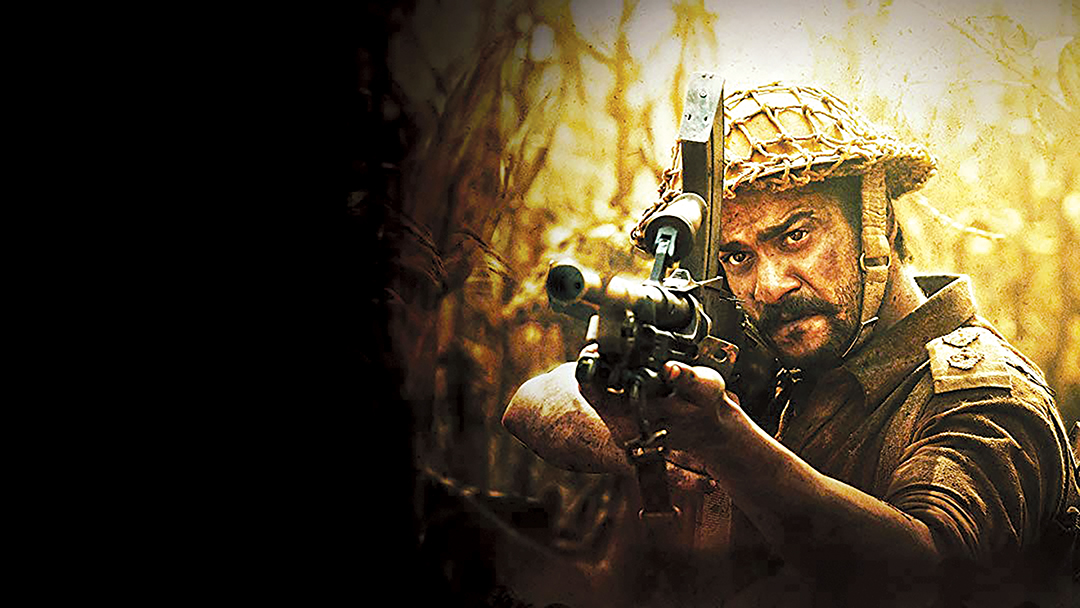
KABIR KHAN’S mini web series on Amazon Prime – The Forgotten Army – bring an often-ignored chapter of INA into the limelight but with a populist viewpoint.
Winston Churchill aptly remarked – ‘History is written by the victors.’ So, when we talk about the history taught through textbooks in India, we often ignore the fact that there are periods in the freedom struggle that are overlooked and not given the attention they deserve.
With the Indian National Congress and Gandhi being the pivots of the national movement, it is not difficult to understand why the INA has so far been pushed backstage. The fictionalised story of Surinder Sodhi – played by Sunny Kaushal – is the nerve centre of the narrative. He is introduced as a war veteran who walks viewers down memory lane, detailing accounts of the Japanese attack on Singapore and his subsequent joining of the INA.
The characters in the storyline are portrayed with the needed gravitas by actors like MK Raina, Nizalgal Ravi and Amala Akkineni. The fresh faces of Karanvir Malhotra, Poloma Monappa and TJ Bhanu bring a breath of fresh talent to the series.
Kabir Khan in his series does what numerous textbooks and essays written in the past fail to do: juxtaposing history with contemporary events (the pro-democracy movement in Myanmar). He has crafted a web series that tries its best to bring to light the formation, role and effects of the INA on the inhabitants of the subcontinent. While doing so, he avoids well-trodden paths and manages to ensure that the leaders of the movement are not the only ones being talked about.
A large volume of Indian literature and shows do throw light on the role and efforts of Subhash Chandra Bose in establishing and leading the INA against the then British Indian Army. However, the role and struggles of foot soldiers who served under ‘Netaji’ is often ignored. The series must be applauded for finding the time and expending the effort in ensuring that it the stories of the foot soldiers of the British Indian Army – later POWs under the Japanese – and finally the soldiers that marched with the slogan of ‘Dilli Chalo’ take centrestage.
However, the narrative suffers from its fair share of problems. The overt descriptiveness, the failure to delve into the complexities in a soldier’s mind and the inability to showcase the tensions of war are some of its glaring issues.
According to interviews, Khan admits that the show is based on an (eponymous) documentary he had shot some 20 years ago after meeting with Captain Lakshmi Sehgal and Gurbaksh Singh Dhillon (senior officer in the INA). The series goes to the other extreme of dramatisation and ill-fitted love stories that amounts to Bollywoodisation of the historical material.
So, it would not be wrong to say that although Khan is able to bring an often-ignored chapter of Indian history to our attention, the series feels like a history lesson by Alex Rutherford — known for the six-book historical fiction series Empire of the Moghul — rather than an actual historian.
Still, as one would expect from a director of Khan’s calibre, the series is worth one’s time – the cinematography for one is good, as is the portrayal of battles. The rest, though, feels half-baked and unbalanced.
An important aspect is the due credit and importance given to the Rani Jhansi Regiment – the female infantry regiment of the INA. The show takes a close look at the inception and trials faced by the female soldiers. However, the lack of footage given to the combat effectiveness or the role of the troops in actual battle becomes a sore point.
Keeping in mind that a large section of the documents related to the trials of the INA officers at Red Fort have been declassified, there still lingers an air of mystery around the contributions and sacrifices the soldiers made. The narrative also fails to shed light on the trials of Major General Shah Nawaz Khan, Colonel Gurbaksh Singh Dhillon and Colonel Prem Sehgal at Red Fort and the problems faced by the soldiers after independence when they were denied the freedom fighter’s pension up till 1972.
All in all, the series by Khan reminds of the patriotic zeal of the soldiers of the INA, who marshalled their resources with support from the Japanese to build an army with the sole aim of liberating India from its British imperialistic masters. It may lack fidelity to facts but then it does epitomise the spirit of Bose’s bold endeavour.
Around 100 international flights were cancelled at Delhi airport due to disruptions linked to the…
Due to mounting debt and constant pressure, he decided to kill his family and leave…
According to the police, information was received from GTB Hospital regarding the admission of an…
Over 75,000 fans filled Jawaharlal Nehru Stadium as Karan Aujla delivered one of India’s biggest…
Jewellery, silver and cash worth Rs 1.15 crore recovered after police apprehended three accused, including…
Featuring over 70 tribal artists and 1,000 artworks, the festival at Travancore Palace will showcase…